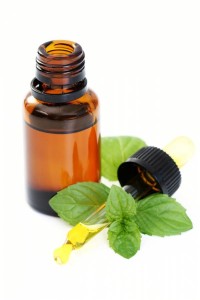Peppermint, and some of the other members of the mint family might well have some performance-enhancing or health-promoting effects you weren’t aware of. For example, mint has been shown to be a painkiller, and has anti-inflammatory, antispasmodic, and antioxidant effects. Those effects are useful for performance, exercise recovery, and health. Just the smell of peppermint has been shown to reduce perceived effort, while improving mood and brainpower. However, compared to the amount of press some aromatherapy’s have received for their ergogenic properties, few studies have been undertaken to actually demonstrate the power of mint, until now.
In a study published in the Journal of the International Society of Sports Nutrition, researchers looked at the effect of peppermint oil on running performance. In the study they used .05ml of peppermint oil in a drink, consumed each day for ten consecutive days. They tested participants before and after peppermint consumption for various indicators of cardiovascular performance.
 The results were actually pretty surprising. You might expect a boost, but the extent that peppermint consumption improved performance was considerable. The oil improved exercise performance, respiratory function, blood pressure, heart rate, and respiratory gas exchange. It also reduced resting blood pressure and heart rate. The amount of total work performed by the test subjects was increased by a whopping 51%, including an increase in the time to exhaustion of about 25%. So not only did the subjects go for a quarter longer than they did without the peppermint oil, their work rate per unit time was higher too. In other words, they went faster for longer.
The results were actually pretty surprising. You might expect a boost, but the extent that peppermint consumption improved performance was considerable. The oil improved exercise performance, respiratory function, blood pressure, heart rate, and respiratory gas exchange. It also reduced resting blood pressure and heart rate. The amount of total work performed by the test subjects was increased by a whopping 51%, including an increase in the time to exhaustion of about 25%. So not only did the subjects go for a quarter longer than they did without the peppermint oil, their work rate per unit time was higher too. In other words, they went faster for longer.
Peppermint has many other benefits: The health benefits of peppermint oil include its ability to treat indigestion, respiratory problems, headache, nausea, fever, stomach and bowel spasms, as well as for pain relief.
- Indigestion/Heartburn/IBS: People often put a few drops of peppermint oil in a glass of water and drink it after their meal for its beneficial digestive properties.
- Headache/Nausea: To quickly alleviate the pain of a headache, simply apply peppermint oil in a diluted form directly on the forehead. Inhaling peppermint oil can eliminate the effects of nausea and motion sickness, simply because of its relaxing and soothing effects.
- Stress: Like most other essential oils, peppermint is able to provide relief from stress, depression and mental exhaustion due to its refreshing nature. It is also effective against anxiety and restlessness. Furthermore, it stimulates mental activity, clears the mind, and increases focus on cognitive tasks.
- Respiratory problems: Menthol, which is abundantly present in peppermint oil, helps to clear the respiratory tract. It is also an effective expectorant and therefore provides instantaneous, though temporary, relief for numerous respiratory problems including nasal congestion, sinusitis, asthma, bronchitis, cold and cough. As a result, it is used in numerous cold rubs and balms. When these cold rubs are applied to the chest, they can quickly remove nasal and respiratory congestion.
- Pain relief: Peppermint oil can be used externally in order to provide relief from pain. It is believed that the presence of calcium antagonism in peppermint oil helps remove pain from affected areas. It is also cooling in nature and is subsequently used to help reduce fever. In case of injury, wound, or healing process, topically apply peppermint oil to the area to reduce swelling, relieve pain, and eliminate the chances of uncomfortable inflammation.
- Immune system: Peppermint oil can increase a person’s immunity to various diseases and is commonly employed by those people with weak immune systems or who seem to frequently suffer from illness. Peppermint oil is also known to have powerful antiviral, antibacterial, and antifungal effects, which is why it is used in so many alternative treatments. It is composed of camphor, menthol, and carvacrol, which are resistant to certain dangerous bacterial strains like E. coli, salmonella, and staph infections.
Peppermint blends well with various other essential oils including eucalyptus, rosemary, lemon, marjoram, so many aromatherapists and herbalists commonly use peppermint oil in their medicinal or aromatic combinations.
There are some risks in using too much peppermint oil, including allergic reaction, heartburn, and headaches. Basically, the same rules apply to using peppermint oil as to any other alternative supplement or dietary change; speak to a doctor, and if you don’t consult a professional, start with small topical doses or skin patch tests to see how it affects your system.